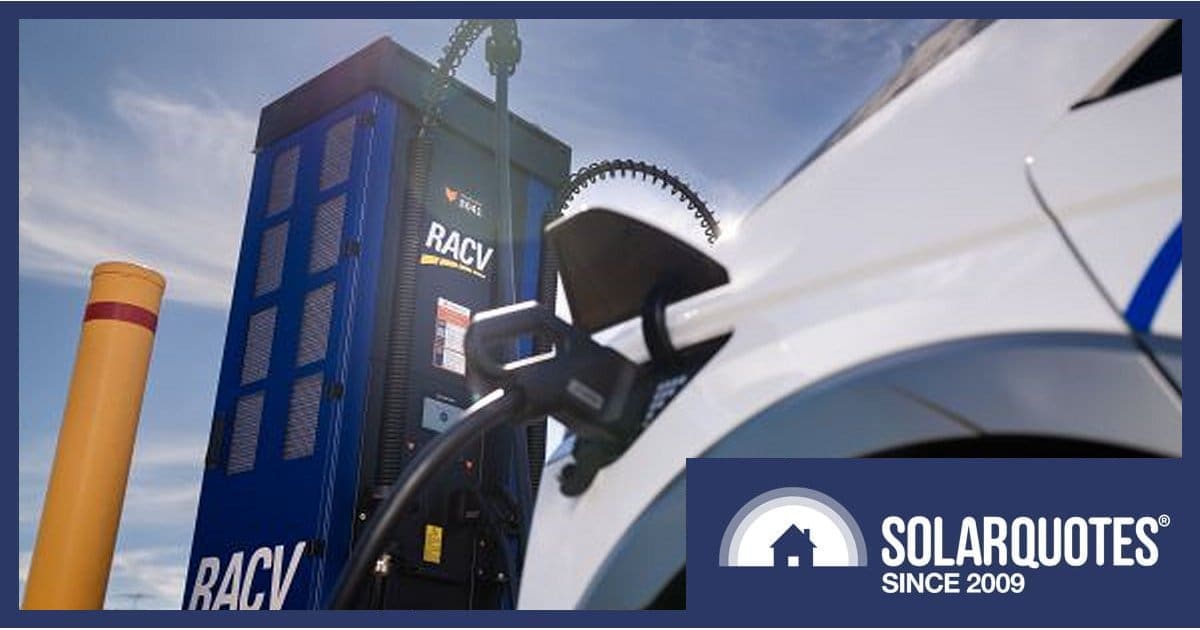
The Royal Automobile Club of Victoria is celebrating completion of major EV charging upgrades across its network, but its solar arm has been clipped across the ear after regulator scrutiny.
First, to the more positive news. RACV says it has finished up on a upgrade of its EV charger network at its resorts, City Club and public locations across Victoria. This includes public EV charging sites at Ballarat, Barnawartha North, Euroa, Horsham, Moe, Torquay and Airport West. Each public site now features new 50kW and 350kW DC chargers.
New 50kW DC chargers have also been installed at RACV’s Inverloch, Cape Schanck and Healesville Resorts. Additionally, the organisation’s Healesville, Torquay, Inverloch, Cape Schanck, Goldfields, Noosa and Royal Pines Resorts, as well as the City Club, have been upgraded to 22kW Level 2 AC chargers (previously 7kW). Even its Noble Park office has had a charger upgrade, to 50kW DC.
Security cameras at each site will also be in place to help provide some peace-of-mind for customers and to discourage charger vandalism.
“RACV’s EV network upgrade reflects our continued commitment to helping Victorians reach their destination safely and efficiently,” said RACV General Manager Energy Services Greg Edye. “Our focus has been to deliver reliable, fast-charging solutions across Victoria, to support RACV Members and customers with keeping their vehicles fully charged for their journey.”
The upgrades commenced in February 2024 and were originally slated to be completed by the middle of this year.
RACV began investing in EV charging a decade ago with “slow chargers” at its Victorian clubs and resorts. In 2017, it became a significant shareholder in Chargefox, and in 2022 became a major shareholder in JET Charge.
RACV Solar Pinged By Regulator
In not-so-positive news, RACV’s solar arm has faced the ire of Australia’s Clean Energy Regulator (CER), which is tasked with (among other things) overseeing Australia’s Small-scale Renewable Energy Scheme (SRES) to ensure compliance with the Renewable Energy (Electricity) Act 2000.
Early this month, the Regulator announced it had taken compliance action against registered agent Formbay Trading Pty Ltd and RACV Solar Pty Ltd.
“Between 1 July 2021 and 5 August 2022, RACV Solar submitted false written statements to Formbay claiming the installation of 28 solar photovoltaic (PV) systems was completed or supervised by a particular Clean Energy Council accredited installer when in fact those systems were installed by another person. Formbay relied on the false information to create 1,945 small-scale technology certificates,” said the Regulator.
The value of small-scale technology certificates (STCs), on which Australia’s solar rebate is based, varies according to market conditions. They’ve been getting close to or bumping up against their maximum possible value ($40 each) for a few years now, but based on a value of $39 back in 2021/22; the certificates in question would have been worth close to $76,000.
The Clean Energy Regulator pointed out both parties have been cooperative in resolving the matter and it had accepted enforceable undertakings to address the issue. This is where things get a bit confusing – the only current RACV enforceable undertaking listed by the CER mentions just 5 systems and is dated 18 June 2024.
Among the commitments by both are developing and implementing compliance programs, inspections and rectifications of any defects (if any are found) in the affected systems and to provide evidence of inspections and any rectification work completed.
RACV Solar incorporated in 2019. A few years ago, it went on an acquisition spree; scooping up solar installation firms Great Ocean Solar and Electrical, Gippsland Solar, Pacific Solar Merimbula and Cola Solar.

 RSS - Posts
RSS - Posts



I wonder how these were picked up.
No one I know has ever managed to have a defect or safety concern taken seriously by CEC, SAA, or CER….